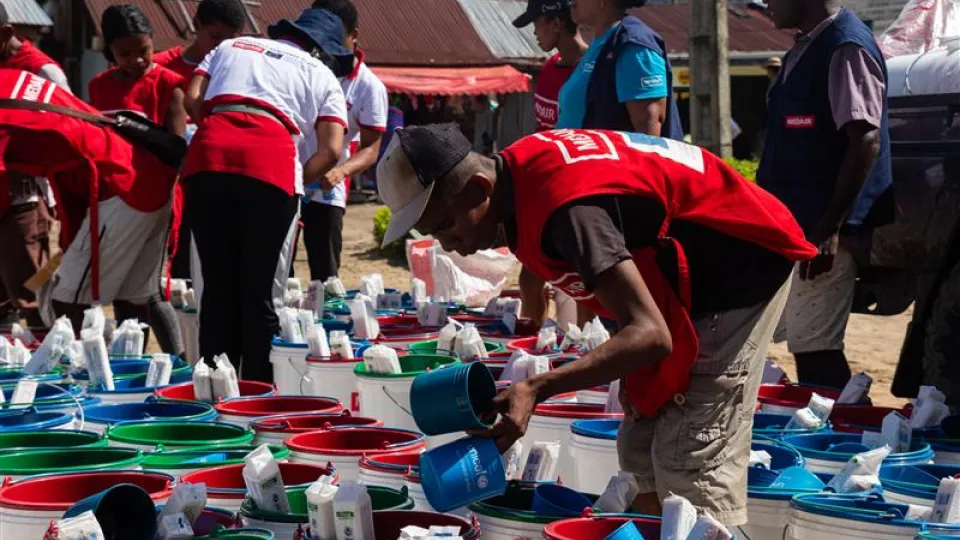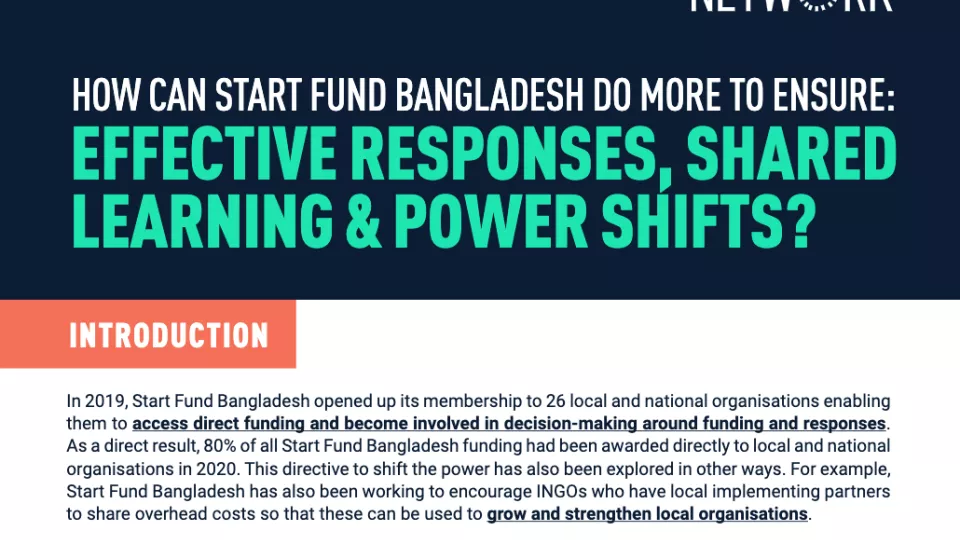
Start Ready: Madagascar Activations
Case studies describe how Start Ready activated in anticipation of two major crises in Madagascar - drought in February 2024 and Cyclone Gamane in March 2024.

Case studies describe how Start Ready activated in anticipation of two major crises in Madagascar - drought in February 2024 and Cyclone Gamane in March 2024.

A case study of HANDS, BSDSB and Muslim Aid's consortium project in response to flooding in Pakistan.

In 2019, Start Fund Bangladesh opened up its membership to 26 local and national organisations enabling them to access direct funding and become involved in decision-making around funding and responses. As a direct result, 80% of all Start Fund Bangladesh funding had been awarded directly to local and national organisations in 2020. This directive to shift the power has also been explored in other ways. For example, Start Fund Bangladesh has also been working to encourage INGOs who have local implementing partners to share overhead costs so that these can be used to grow and strengthen local organisations. To understand more about further changes that Start Fund Bangladesh could make, we listened to some of the reflections of Sina Chowdhury and Sirajul Islam who work for two of the local organisations that joined in 2019. The verbatim quotes from the interviews provide a powerful and rich narrative around their experience working with Start Fund Bangladesh and as humanitarians and have led us to formulate three main lessons for the Start Network: BE MORE INCLUSIVE TO BE MORE EFFECTIVE; UPSKILL TO EMPOWER; and CHAMPION FOR CHANGE. This report would be of interest to all those working towards a system change to a more locally led humanitarian system that is more accountable to those affected by crisis.

Start Fund Bangladesh developed standing operating procedures (SOP) after taking stock of current happenings and in-depth discussion with donors and humanitarian leaders. The SOP targeted safety measures at multiple levels to ensure the ultimate prevention of transmission at the community level. Some of these included: Tracking physical health of staff and volunteers throughout the project period; In addition, all personnel involved in the project needed access to personal protective gear (masks and sanitizers) Adopting new practices at the organisational level: providing accommodation facilities to staff and volunteers if needed; giving compensatory allowances to those working in direct response; increasing organisational cleanliness as per WHO standards Following strict guidelines during response and: distributing relief items through door-to-door delivery and drawing distant circles.
The Asia Regional Platform of the Transforming Surge Capacity project has gathered 7 international NGOs to create the regional shared roster Go Team Asia, which provides surge support to emergencies across the region. Roster members receive many capacity building opportunities; trainings, simulation exercises, one-to-one coaching, and Trainings of Trainers (ToT). This case study shows how the collaborative nature of capacity building for Go Team Asia improves individuals’ and organisations’ ability to work together, which can help them provide faster and more adequate assistance to affected communities.
As part of the Transforming Surge Capacity project, seven international humanitarian NGOs have come together to test out collaborative app roaches to surge response in the Asia region. This case study highlights how Islamic Relief, one of the platform partners moving towards more regionalised surge systems, has been able to support inter - agency collaboration in the project, and how it used le arnings and outputs of the project to improve its own surge mechanisms.
Mutual trust is vital in collaboration, and collaboration is what the Transforming Surge Capacity Project aims to achieve, to ultimately improve the quality of emergency responses in Asia.